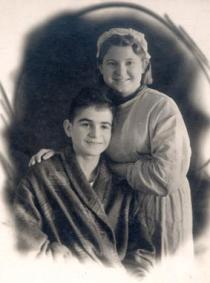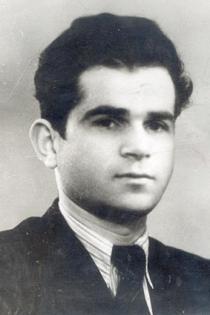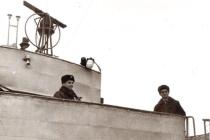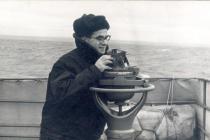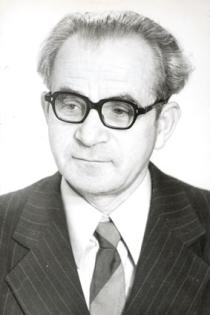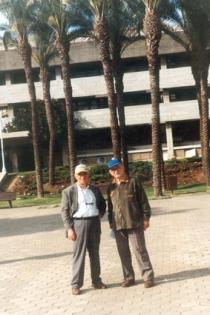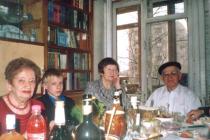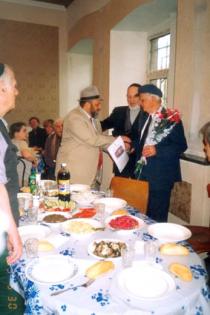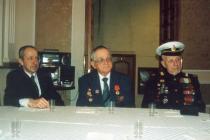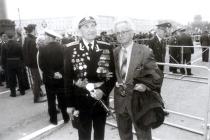This photo was taken in St. Petersburg in 2005. Here you see me at the ceremonial meeting devoted to the 60-th anniversary of the Victory over Germany. The meeting took place in the Sephardi Center. There I addressed the audience with my front memories. Now I’ll share some of them with you.
In August 1942 I was called up. But I got to the front line not in a day. At first they sent me to Samarkand to take a course organized for inexperienced soldiers. After that course I was put down for allowances as a soldier of regiment ready to leave for the front line. But for some reason the regiment departure was postponed, therefore I was sent to Ashkhabad to School of Junior Leaders. A lot of junior commanding officers were lost at the very beginning of the war, therefore there was lack of that sort of officers. I finished that School and (as I had secondary education) was sent to the courses for commanders of middle level. I spent in Andizhan 3 months studying there. After that I waited for appointment for several months and at last was detached for service at the Reserve officer regiment of the Western front. They informed me only about its staff location: it was in Tula. So I left for Tula. It happened in April 1943.
I do not remember why we made the first stop in Yasnaya Polyana. [Yasnaya Polyana is a homestead of Lev Tolstoy. In 1941 during 2 weeks it was occupied by fascists. They placed there a German military hospital. Fascists buried their dead soldiers near the tomb of Tolstoy. Crosses with swastika stroke our eyes.
In Tula I found the army headquarters not without difficulty. There I was told that I was appointed the commander of the rifle regiment #529 (army #50). So I had the only aim: to find that regiment in the fields of action. And I started having a haversack and a document which allowed me to get C. ration. From time to time I met fellow travelers, sometimes I saw local residents who were coming back to their liberated settlements. On the front road junctions I saw direction signs like Smirnov's Disposition or Artamonov's Disposition. That was the veiled way to name military units. I hardly found out that Artamonov's Disposition was the very place I needed. At last I got there after many days of wandering.
My platoon was located on the fringe of the forest. At that time operations were of local character. We had to suppress centers of resistance of retreating Germans. Thanks God, our losses were not bad. Soon we passed to the offensive, which was over by the end of September. Last fights which took place several kilometers away from the left coast of Dneper, were especially bloody. In my platoon there remained less than half of soldiers' number. In order to get prepared for the following fights, we stopped in the wood near the front line (near the River Pronya). It was interesting to watch the way people immediately rendered that forest habitable: there appeared tents, dugouts, earth-houses. These earth-houses saved many lives when the enemy airplane started bombing. No people were killed, but 4 horses were lost. Suddenly bombardment stopped for some reason. We went on living there, and lived even comfortably: besides field-kitchens we had a bath-house, a hairdresser's, a place for repair of uniforms. Soldiers watched films. But all the time we kept the army regulations strictly. I used to set a guard in the zone of our regiment. One evening I was walking from one post to another and heard a hail 'Stop! Who's coming?' I had no time to answer and heard the report of a gun. The bullet twanged in the air a centimeter away from my ear. Later the soldier confessed to be asleep at the switch. He awoke from dream and fired a shot automatically. We did not punish him.
Fresh forces were young people from liberated territories, who reached call-up age during the years of occupation. But sometimes we came across adult men: deserters and polizei soldiers. [During the Great Patriotic War people in occupied territories called a local resident serving in fascist police a polizei.]
Their fate was decided by special services.
They lacked boots for new soldiers, therefore some recruits joined the ranks wearing bast shoes. [Bast shoes are Russian country wicker footwear made of bark of young deciduous trees] .

